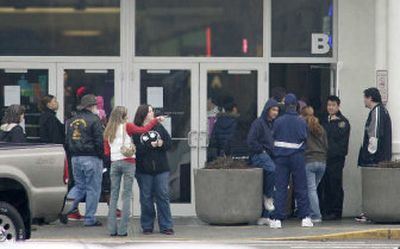Shootings show malls vulnerable

TACOMA – In an instant, the controlled chaos of holiday shopping turned bloody when a man strolled into a busy shopping mall and opened fire on shoppers with an assault rifle.
Sunday’s shooting rampage at the Tacoma Mall, coming just days before the start of the holiday crush, highlighted the vulnerability of America’s shopping centers.
At malls across the country, thousands of people come and go, often carrying bulky packages. No metal detectors check them for weapons. And there is always the possibility that somewhere in the crowd is a disgruntled employee, a jilted lover or a mental patient on the edge.
“If someone is determined, I don’t know that you can prevent it,” said Capt. Mark Couey, who heads homeland security for the Washington State Patrol.
But Couey noted that violence at malls is extremely rare.
“I don’t think it calls for people to be paranoid or install metal detectors,” Couey said. “I don’t think the public would stand for either.”
In the Tacoma case, Dominick Sergio Maldonado, 20, was arrested Sunday after six people were hurt, one critically. Maldonado had sent a text message to his ex-girlfriend minutes before the rampage, saying, “Today is the day the world will know my anger,” the woman said Monday.
Maldonado, of Tacoma, was ordered held on $2 million bail after pleading innocent on Monday to multiple charges that include first-degree assault.
Police said they got a call just before the shootings erupted, with the caller saying he was armed with two assault rifles and about to start firing. When the dispatcher asked the man where he was, he replied, “Just follow the screams,” court papers released Monday said.
At the SuperMall in Auburn, Wash., a shopping complex a few miles from the Tacoma Mall, security measures include video surveillance, 24-hour patrols, training for security officers and a police substation. But Dennis Nicholson, the mall’s general manager, said such precautions cannot necessarily stop something like Sunday’s rampage.
“We can’t prevent that individual from doing that,” Nicholson said. “In this day and age in particular, I think that the American public needs to be ever so more aware of their surroundings. It doesn’t matter if they’re in a shopping mall or a sports arena.”
In the United States, there are about 1,200 enclosed malls and 44,000 shopping centers with a total of 190 million shoppers a month, said Malachy Kavanagh, a spokesman for the International Council of Shopping Centers.
Malls have long been considered vulnerable to terrorist attacks. In the past year, malls in several states have taught security guards how to spot suicide bombers through training offered by the Homeland Security Department.
The risk is not likely to keep shoppers away from the malls.
“It’s all about the time and the place,” said shopper Deb Kraft, who was walking in the Valley Mall in Union Gap, near Yakima. “I don’t think they’re going to target a mall any differently than they will target a football game or mini-mart or a liquor store.”
Economists say that shootings like the one in Tacoma have no effect on shoppers’ behavior.
“Unfortunately, random shootings of this nature are not a unique event,” said Carl Steidtmann, chief economist at Deloitte Research. “I think until it happens in a material way where there are mass casualties, I just don’t think it’s something that crosses people’s mind.”
In the Tacoma Mall shooting, Maldonado surrendered about four hours after he ducked into a music store and took four hostages, all of whom were released unharmed, authorities said.
In the documents, prosecutors said Maldonado denied intending to shoot anyone but wanted media attention.
The documents said police searched Maldonado’s car and bedroom, finding a formula for making the deadly poison ricin, as well as bomb-making diagrams and materials, and body shooting targets.
Two of the hostages, both with military experience, eventually helped disarm Maldonado and walked him out of the store.
“The look in his eyes toward the end was a scared kid,” said Jon Black, 32, an active-duty Army soldier. “He had tears in his eyes when we were taking the weapons away from him and he was in tears as we were taking him out.”
Court documents said a second hostage, Joseph Hudson, who served as an Army medic in Iraq, told police “that he was more frightened inside the store than he ever was in Iraq.”
Maldonado’s lawyer, public defender Sverre Staurset, said after Monday’s court hearing that he intends to find out what made his client snap.
“Anything as horrible as this must have some genesis,” Staurset said. “Normal people don’t show up at the mall with guns.”
Tiffany Robison, 20, Maldonado’s ex-girlfriend, said in an interview broadcast Monday on ABC’s “Good Morning America” that he sent her a text message shortly before noon reading: “Today is the day that the world will know my anger.”
“I think honestly that he just wanted attention. It’s the sick attention that he wanted,” Robison told ABC. They broke up months earlier “because of an issue with a drug,” she said.
Her mother, Mary Simon, 47, of Tacoma, said she was at home when her daughter got the troubling cell phone text message.
“When she got the message, she freaked out and took it very seriously,” Simon told the Associated Press by telephone from her home Monday. “And then when she heard about the shooting, she knew in an instant that it was him.”
Later, Robison got a call from Maldonado at the mall during the shooting spree and hostage standoff.
“He just said, ‘Well, I just shot up the mall, and I’m busy now. I’m still in the Sam Goody,’ ” Simon said.